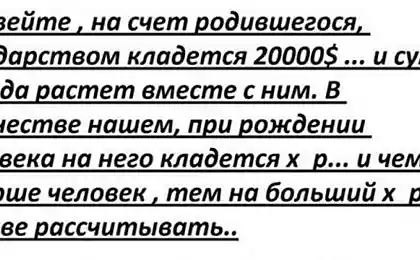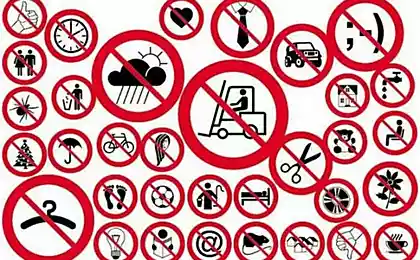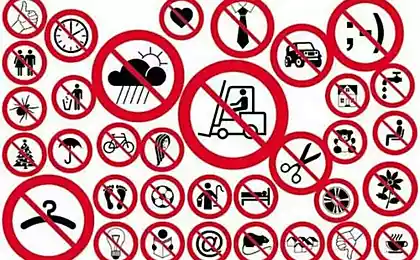550
What is the meaning of the main Russian insults
Russian people are sharp on the tongue. The word, as they say, in a pocket will not climb. However, taking once again expletive of "lexical pocket", not the superfluous will learn about its original meaning. Why is it, in fact, has become a dirty word?
Eighty six million two hundred seventy three thousand nine hundred nineteen
Fool
Perhaps the most common (along with "female" option – a fool) of domestic expletives. I must say that "fools" in Russia appeared relatively recently: in wide use that word entered the second half of the XVII century with a light hand Avvakum.
The leader of the conservatives in the hearts of so called fans "devilish wisdom": rhetoric, philosophy, logic, etc. Interestingly, the Champions of the old faith then became known as "fools" defenders of the correction of the liturgical books during the reforms of Patriarch Nikon.
Seventy four million six hundred twenty two thousand five hundred forty nine
It is interesting that Habakkuk spied the word of skomoroshenko culture: it was probably the name of one of the gang of buffoons. Linguists believe that "fool" comes from the Indo-European dur (bite, sting) and literally translates as "bitten", "stung". Perhaps the "title" fool was associated with ritual initiation into clowns – according to one version the person would have to survive the bite of a Viper.
By the way, based on this hypothesis, the adage "fool flock together", most likely, initially, was related to the clowns. Fools, in the current semantic meaning, hardly able to identify their own kind.
Swine
Forty million seven hundred seventy four thousand eight hundred seventy two
The word comes from the verb "to drag", "dragging". Originally "bastard" meant "svolochennaya anywhere junk". Then this concept began to be transferred to vagrants and other "useless people".
Scoundrel
Sixty seven million nine hundred seventy four thousand four hundred forty
This curse we have learned from the Lithuanians, who used the term "vile" to people with low-born origins. In the XVIII century the word "vile people" was the official term used in government documents designated so-called "irregular" citizens, not part of the petty bourgeoisie.
As a rule, they were laborers, migrant workers from the countryside living in the city on a semi-legal status (such as "limitchikov" of the Soviet time). And only in the end of XVIII century the word "bastard", "bitch" added to the dictionary Philistine intolerance.
Scum
Eighty one million six hundred seventeen thousand one hundred ninety three
This word (albeit in the plural – "scum") existed peacefully in the Russian lexicon for several centuries, meaning only the liquid residue at the bottom of the vessel. In the XIX century with someone's light, sophisticated, hands it was transferred to the inhabitants of pubs, preferring to drink a drop of alcohol their other drinks. Then came the expression "scum of society": the so-called antisocial elements of the city.
Scoundrel
Fifty eight million two hundred ninety seven thousand seven hundred sixty two
The exact meaning of this word today can not explain no scientist. However, almost all linguists agree that "git" (aka "scum") have a relative of "frost". Of course, hardly "bastard" can be deciphered as "frosty people."
Even "moron" as translation, is also not very fit – too much expression of contempt, usually invest when they say "scum". There is a hypothesis that the villains were called criminals executed by drowning under the ice. In Russian tradition it was believed that people who took such a death becomes a "zalojnik dead," that is, doomed to eternal wandering on earth in a Ghost or even vampire.
Rubbish
Fifty seven million five hundred twenty thousand two hundred thirty five
Probably originally used to mean "something ripped off" – tree bark, animal skin, etc. Then, as came to the conclusion the linguists, "stuff" became known as something of no value. However, there are exotic versions that argue that the word is somehow connected with the death by flaying. In other words "rubbish" called people "worthy" of such executions.
Cattle
Thirty one million one hundred sixty two thousand four hundred seventy six
It's simple: "cattle" is translated from Polish, like cattle. Arrogant nobles so preferred to call agricultural workers. Then bad habit was passed on to the Russian nobility, and from them went for a walk on bourgeois environment. Interestingly, the Czechs, poles neighbors use the word "redneck" to mean "shelter", "housing". published
Author: Alexey Zheleznov
The Mayans knew about the irregularity synodic period of Venus
Why not shake hands across the threshold
Source: grimnir74.livejournal.com/7366118.html
Eighty six million two hundred seventy three thousand nine hundred nineteen
Fool
Perhaps the most common (along with "female" option – a fool) of domestic expletives. I must say that "fools" in Russia appeared relatively recently: in wide use that word entered the second half of the XVII century with a light hand Avvakum.
The leader of the conservatives in the hearts of so called fans "devilish wisdom": rhetoric, philosophy, logic, etc. Interestingly, the Champions of the old faith then became known as "fools" defenders of the correction of the liturgical books during the reforms of Patriarch Nikon.
Seventy four million six hundred twenty two thousand five hundred forty nine
It is interesting that Habakkuk spied the word of skomoroshenko culture: it was probably the name of one of the gang of buffoons. Linguists believe that "fool" comes from the Indo-European dur (bite, sting) and literally translates as "bitten", "stung". Perhaps the "title" fool was associated with ritual initiation into clowns – according to one version the person would have to survive the bite of a Viper.
By the way, based on this hypothesis, the adage "fool flock together", most likely, initially, was related to the clowns. Fools, in the current semantic meaning, hardly able to identify their own kind.
Swine
Forty million seven hundred seventy four thousand eight hundred seventy two
The word comes from the verb "to drag", "dragging". Originally "bastard" meant "svolochennaya anywhere junk". Then this concept began to be transferred to vagrants and other "useless people".
Scoundrel
Sixty seven million nine hundred seventy four thousand four hundred forty
This curse we have learned from the Lithuanians, who used the term "vile" to people with low-born origins. In the XVIII century the word "vile people" was the official term used in government documents designated so-called "irregular" citizens, not part of the petty bourgeoisie.
As a rule, they were laborers, migrant workers from the countryside living in the city on a semi-legal status (such as "limitchikov" of the Soviet time). And only in the end of XVIII century the word "bastard", "bitch" added to the dictionary Philistine intolerance.
Scum
Eighty one million six hundred seventeen thousand one hundred ninety three
This word (albeit in the plural – "scum") existed peacefully in the Russian lexicon for several centuries, meaning only the liquid residue at the bottom of the vessel. In the XIX century with someone's light, sophisticated, hands it was transferred to the inhabitants of pubs, preferring to drink a drop of alcohol their other drinks. Then came the expression "scum of society": the so-called antisocial elements of the city.
Scoundrel
Fifty eight million two hundred ninety seven thousand seven hundred sixty two
The exact meaning of this word today can not explain no scientist. However, almost all linguists agree that "git" (aka "scum") have a relative of "frost". Of course, hardly "bastard" can be deciphered as "frosty people."
Even "moron" as translation, is also not very fit – too much expression of contempt, usually invest when they say "scum". There is a hypothesis that the villains were called criminals executed by drowning under the ice. In Russian tradition it was believed that people who took such a death becomes a "zalojnik dead," that is, doomed to eternal wandering on earth in a Ghost or even vampire.
Rubbish
Fifty seven million five hundred twenty thousand two hundred thirty five
Probably originally used to mean "something ripped off" – tree bark, animal skin, etc. Then, as came to the conclusion the linguists, "stuff" became known as something of no value. However, there are exotic versions that argue that the word is somehow connected with the death by flaying. In other words "rubbish" called people "worthy" of such executions.
Cattle
Thirty one million one hundred sixty two thousand four hundred seventy six
It's simple: "cattle" is translated from Polish, like cattle. Arrogant nobles so preferred to call agricultural workers. Then bad habit was passed on to the Russian nobility, and from them went for a walk on bourgeois environment. Interestingly, the Czechs, poles neighbors use the word "redneck" to mean "shelter", "housing". published
Author: Alexey Zheleznov
The Mayans knew about the irregularity synodic period of Venus
Why not shake hands across the threshold
Source: grimnir74.livejournal.com/7366118.html
14 TED lectures for those who suffer from fatigue and creative burnout
Emotional energy: scale of tones Ron Hubbard























